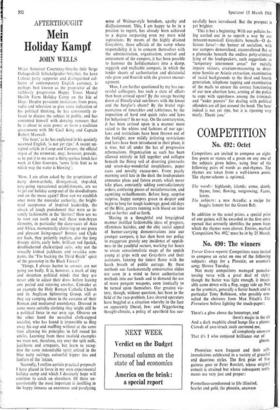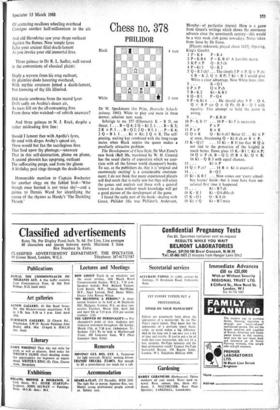COMPETITION
No. 492: Octet
Competitors are invited to compose an eight- line poem or stanza of a poem on any one of the subjects given below, using four of the following pairs of words as end-rhymes. The rhymes are taken from a well-known poem. The rhyme-scheme is optional.
The words : highlands, islands; come, dumb, thyme, lime; flowing, outgrowing; Fauns, lawns.
The subjects : a new Arcadia; a recipe for haggis; lament for the Green Belt.
In addition to the usual prizes, a special prize of one guinea will be awarded to the first entry opened that correctly identifies the poem from which the rhymes were chosen. Entries, marked `Competition No. 492,' must be in by 25 March.
No. 490: The winners
Trevor Grove reports: Competitors were invited to compose an octet on one of the following subjects: elegy for a Phoenix; an arsonist's song; Shrove Tuesday.
Not many competitors managed pancake- tossing verse with a great deal of style: though the batter was light enough, it invari- ably came down with a flop, soggy side up. Not so the arsonists, generally a fierier bunch and in particular Tony Robinson, who possibly con- sulted the choruses from Max Frisch's The Fireraisers before lighting the touch-paper : There's a glow above the housetops, and there's magic in the air And a dark mephitic cloud hangs like a plume; Crowds of awe-struck souls surround me, all completely unaware That it's I who conjured brilliance out of gloom.
Phoenixes were frequent and their self- immolations celebrated in a variety of graceful and decorous styles. The first prize of five guineas goes to Peter Rowlett, whose original conceit is strained but whose subsequent senti- ments are very just and proper: Prometheus-condemned to life illimited, Scarlet and gold, the phoenix, unaware Of scattering swallows wheeling overhead Consigns another half-millennium to the air.
And old Herodotus saw your shape outleant Against the flames. Now temple lyres Echo your ancient filial death-lament As you invoke your old immortal fires.
Three guineas to Dr R. L. Sadler, well versed in the conventions of classical plaint:
Haply a wyvern from his crag outleant, Or plaintive dodo hovering overhead, With mythic creatures joined a death-lament, Not knowing of thy life illimited.
Did music sombrous from the muted lyres Drift sadly on Arabia's desert air, As tears fell on the all-consuming fires From those who watched—of rebirth unaware?
And three guineas to N. J. Rock, despite a rather misleading first line: Should I lament thee with Apollo's lyres,
Or rend with dirges Araby's spiced air, These would but fan the sacrilegious fires That feed upon thy plumage,—unaware That in this self-destruction, plume on plume, A second phoenix has upsprung, outleant The suffocating purge, and from the gloom A birthday peal rings through the death-lament.
Honourable mention to Captain Rochester for another elegy on the fabled bird—'Who though once burned is not twice shy'—and a guinea to Dennis Ward for identifying the source of the rhymes as Hardy's 'The Darkling Thrush.'











































 Previous page
Previous page